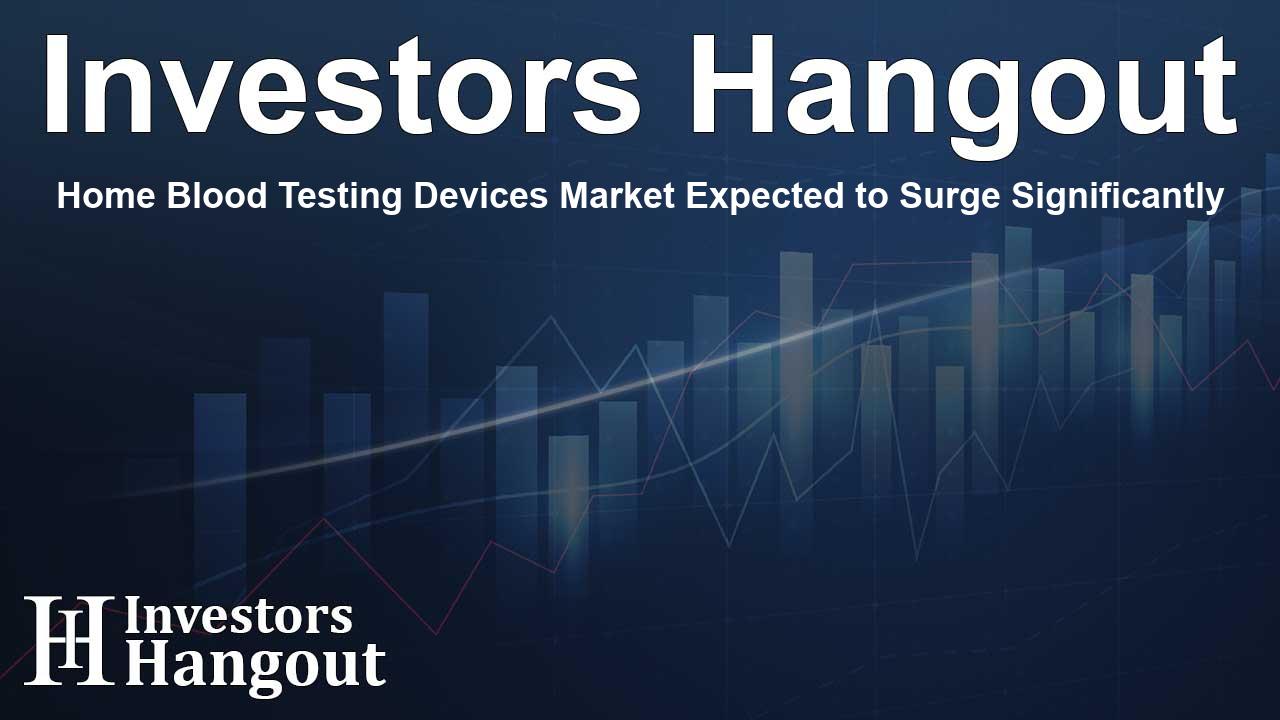Home Blood Testing Devices Market Expected to Surge Significantly

Overview of the Home Blood Testing Devices Market
The global market for home blood testing devices is projected to grow significantly, with a forecasted increase of USD 2.96 billion from 2024 to 2028. This growth is largely driven by the rise in contagious disease outbreaks and the expanding role of artificial intelligence (AI) in health technology. Industry experts indicate that the market is expected to grow at a compound annual growth rate (CAGR) of 4.66% during this period. The integration of advanced technologies in home blood testing devices is changing how people monitor their health in meaningful ways.
Key Market Drivers
Several key factors are fueling the expansion of the home blood testing devices market. Notably, advancements in technology have enabled point-of-care testing solutions that empower users to conduct tests conveniently and with minimal training. The ability to receive quick and accurate results motivates an increasing number of individuals to turn to home blood testing methods. Additionally, the incorporation of AI in these devices enhances accuracy and data interpretation. For example, the HemoScreen by PixCell Medical Technologies Ltd. enables real-time blood diagnostics through innovative AI-assisted technology.
Technological Innovations
Recent advancements in connectivity have made modern home blood testing devices significantly more user-friendly. These devices allow results to sync effortlessly with mobile applications or electronic health platforms. Bionime Corp.'s home blood testing solutions exemplify this trend, facilitating the seamless integration of blood glucose readings into hospital data management systems. These innovations not only enhance testing efficiency but also improve communication between patients and healthcare providers, thus supporting overall health monitoring.
Consumer Awareness and Market Trends
The growing awareness among consumers about health management is a crucial element driving the market forward. With the convenience of self-testing, people can now easily monitor their health and manage conditions like diabetes through straightforward home diagnostic tests for blood glucose, A1C, and other metrics. The market is witnessing a notable increase in the demand for diabetes testing kits, solidifying their place as a leading segment in this industry.
Emerging Market Dynamics
Emerging trends include a rise in point-of-care testing across various diagnostics, along with a growing demand for serological and antibody tests. Market dynamics are also shaped by demographic shifts, increasing health consciousness, and available spending power. The transition towards preventative healthcare is generating interest in early diagnosis through home testing solutions, with companies like Athelas Home leading this evolving market, complementing traditional clinical testing methods.
Market Challenges and Regulatory Landscape
Even with a promising growth trajectory, the home blood testing devices market faces significant challenges, primarily stemming from regulatory hurdles. Major regulatory bodies impose stringent guidelines that manufacturers must adhere to for compliance. These regulations necessitate extensive clinical testing to ensure product safety and effectiveness, which can be time-consuming and expensive. Moreover, updates from the European Union regarding medical devices may introduce additional constraints that could hinder market innovation and delay product launches.
Challenges with Product Accuracy
Maintaining high accuracy and reliability in home blood testing devices remains a significant challenge in the market. Manufacturers are increasingly prioritizing these demands to prevent issues related to product failures. As the population ages and healthcare needs expand, the market must continue to innovate while complying with strict regulatory frameworks designed to ensure consumer safety.
The Future Market Outlook
Looking to the future, the home blood testing devices market is expected to evolve in alignment with both consumer demands and technological advancements. As more local businesses enter the market, access to self-testing kits is likely to increase, further promoting a model of preventative healthcare. With ongoing efforts to refine technologies that facilitate remote testing while minimizing risks, the market is poised to explore new applications that enhance patient care, particularly for those managing chronic illnesses.
Frequently Asked Questions
What factors are contributing to the growth of the home blood testing devices market?
The growth is largely driven by advancements in technology, a rise in health awareness, and the increasing prevalence of chronic diseases that require regular monitoring.
How does AI influence home blood testing devices?
AI improves the accuracy of test results and aids in better data interpretation, making health monitoring more efficient.
What regulatory challenges do manufacturers face?
Manufacturers navigate a stringent regulatory landscape that requires extensive clinical trials to ensure product safety and efficacy, which can be both costly and time-consuming.
Which companies play a significant role in this market?
Key players driving growth in this market include Abbott Laboratories, Becton Dickinson, Thermo Fisher Scientific, and more.
What trends are shaping the future of home blood testing?
Trends such as growing consumer awareness, the convenience of self-testing, and the integration of digital health technologies are critical in shaping the future of this landscape.
About The Author
Contact Thomas Cooper privately here. Or send an email with ATTN: Thomas Cooper as the subject to contact@investorshangout.com.
About Investors Hangout
Investors Hangout is a leading online stock forum for financial discussion and learning, offering a wide range of free tools and resources. It draws in traders of all levels, who exchange market knowledge, investigate trading tactics, and keep an eye on industry developments in real time. Featuring financial articles, stock message boards, quotes, charts, company profiles, and live news updates. Through cooperative learning and a wealth of informational resources, it helps users from novices creating their first portfolios to experts honing their techniques. Join Investors Hangout today: https://investorshangout.com/
The content of this article is based on factual, publicly available information and does not represent legal, financial, or investment advice. Investors Hangout does not offer financial advice, and the author is not a licensed financial advisor. Consult a qualified advisor before making any financial or investment decisions based on this article. This article should not be considered advice to purchase, sell, or hold any securities or other investments. If any of the material provided here is inaccurate, please contact us for corrections.
